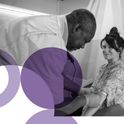“Completely and utterly shocked”—that’s how Nick Furtak-Wells, the CEO of NIQS Tech, felt after winning this year’s Royal Society of Chemistry (RSC) Emerging Technology award. A spinout company started by PhD students from the University of Leeds, NIQS Tech is developing a groundbreaking sensor that will allow people with diabetes to check their glucose levels without drawing blood.
In order to manage their symptoms, people with diabetes have to check their glucose levels regularly throughout the day using a blood glucose monitor, which requires pricking their fingertips with a needle. However, the pain involved with this method deters some people from checking their glucose levels as frequently as they should. “You need that frequency of measurement to maintain a strong control on your glucose levels,” Furtak-Wells tells Prospect. “Because if they start to fluctuate, going too high or too low, and spending a long time in those regions, that’s what can lead to unnecessary health complications”.
NIQS Tech’s goal, then, is to deliver a “user-friendly, affordable and accessible device that will encourage that frequency of measurement and will enable effective diabetes management for millions of people worldwide.”
Using non-invasive quantum sensing, Furtak-Wells and his team plan to create two devices (one handheld, one wearable) that will take targeted measurements under the skin. What makes NIQS Tech’s product stand out is its ability to mitigate certain limitations that are found with the current, standard sensing technologies—spectroscopic techniques—which are known to be less effective when used on those with darker skin tones or thicker skin.
While the idea started out as a theoretical solution to a “very niche quantum physics problem,” Furtak-Wells and his team recruited the help of the chemical engineering team at Leeds to turn it into something physical. “We were just trying to find something that we could apply our research to where there was a critical unmet need in the world. And diabetes was, and still is, a huge one,” he says.
The team first applied to the RSC Emerging Technologies competition in 2022, after finishing their PhDs. However, the in-person pitch collided with a round of fundraising, which meant Furtak-Wells and his team were abroad. They applied again this year and, despite Furtak-Wells’s nerves, their pitch was successful, winning them the top spot in the competition’s Health category.
Furtak-Wells says the RSC awards are “much needed”. “The Royal Society of Chemistry is huge,” he continues. “For companies like ours looking for their first or next big round of funding, or people fresh out of university with an idea, giving them that platform and the opportunity to win a £25,000 prize pot and to network with business experts, investors and potential collaborators, that can be really transformative for people.”
Up next for NIQS Tech is their next stage of ex vivo trials for the first-generation prototype, which will hopefully supply them with the supporting data to allow them to apply for ethics approval from the Medicines and Healthcare products Regulatory Agency (MHRA) and move on to human trials. These two steps will help them in applying for their next round of funding next summer, which will see them expanding their trials and moving towards creating a smaller, more usable device. Eventually, Furtak-Wells says, the company will apply for Food and Drug Administration (FDA) approval, which will open them up to the US market, where “diabetes is a huge problem”.
“I think that having something like what we’re hoping to realise with our company, will change a lot of people’s lives,” says Furtak-Wells. “For us, that’s the real driving factor.”












